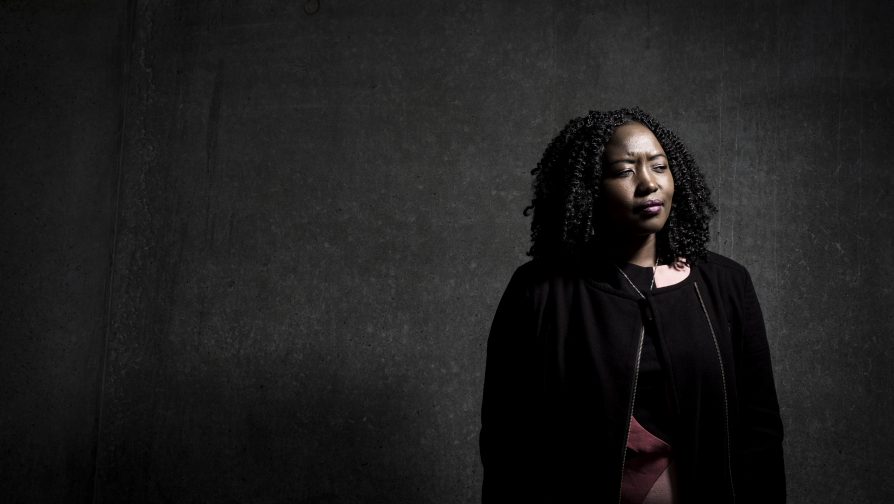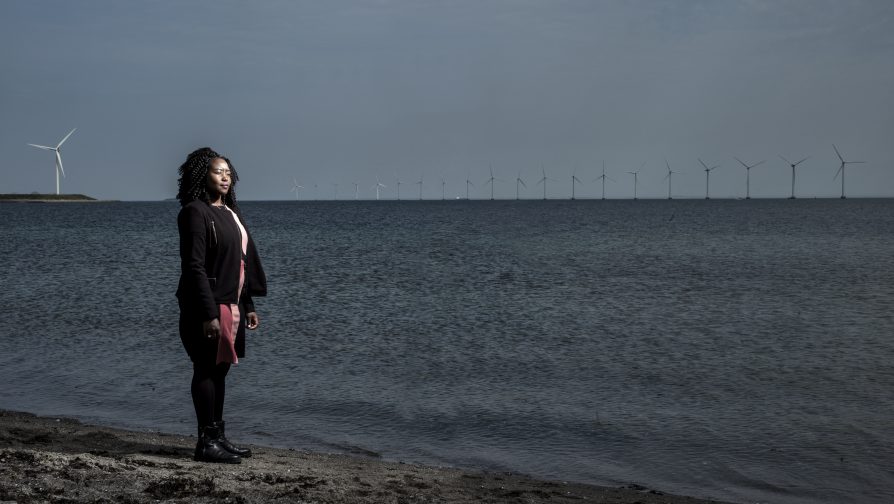When Angelique was resettled as a refugee in Denmark after seven years on the run, she started to dream again. About education, possibilities and the future.
© Rasmus Flindt Pedersen
Denmark was calm. That’s the sentiment Angelique Umugwaneza mentions today when she recalls her arrival in Denmark eighteen years ago, still so vivid in her mind.
She and her sister had been selected by Denmark to be resettled, and so they traveled to the Scandinavian country from the Central African Republic to begin their new life.
“What I remember was the calm. No one was shooting around us anymore. After what we had experienced, it was a privilege to come to Denmark,” says Angelique, who had fled Rwanda with her family during the genocide and had been unsettled for seven years.
“We crossed the entire Congo on foot, and it was not a pleasant stroll. We were fleeing and persecuted. We lost family members along the journey. Some died, others went missing. In the end it was only me and my sister. It was hard, really hard. I lost hope and the notion that my life could be anything different.”
“After what we had experienced, it was a privilege to come to Denmark.”
But her life did become different when she and her sister, 20 and 18 years old at the time, were placed in a village in Thy in northern Jutland. They were taken under the wings of Denmark – and the local community.
“Someone had taken care of us before we had even arrived. There was already a plan for us to get a place to live, to be welcomed, to be sent to a language school, and to be given the peace to get settled and learn to manage. The municipality was exceptional,” she says.
“In the public debate today, the work to integrate refugees is constantly being price-tagged, and I’m quite aware that it is expensive. But one can also turn it around and ask, what it is worth? And for me, it was invaluable.”

When Angelique was resettled as a refugee in Denmark after seven years on the run, she started to dream again. ©Rasmus Flindt Pedersen
Just as crucial was the welcome that Angelique and her sister received in the village. On their first night in Thy, Angelique was wondering where everybody else was. If they were the only ones living there? Because the deserted road with a few scattered houses was starkly different from the world she knew – where people live close and the streets are constantly buzzing with life.
“But soon, someone came knocking on our door and invited us for coffee. People were curious, in a good sense, and some women in the village took us out walking on Sundays because they thought we should become part of the community.”
And so they did. A local gathering was organized to welcome the refugees, they quickly got to know everyone, and Angelique still visits her friends in Thy today.
“Now that I was taken care of, I suddenly realized that I had opportunities. I started to dream again.”
Thy’s calm surroundings provided Angelique with the time to reflect about what she had been through – “the ghosts of the past needed to be dealt with”, as she says. These reflections later resulted in an entire book, “The Children of Rwanda”, dealing with horrific experiences in the wake of the genocide. But Angelique now also found herself capable of thinking about the future.
“During the many years on the run, it was basically all about survival, to cover primary needs. Now that I was taken care of, I suddenly realized that I had opportunities. I started to dream again, even though it was a long time ago.”
First and foremost, Angelique’s dreams revolved around education. It had played a central role in her upbringing as her father was very concerned that his children received an education so they could make it far, she recalls. And so, after completing an intensive language training, Angelique got her high school diploma, enabling her to continue to university.
And she kept going. Her CV today includes a Master of Science in Political Science from the University of Aarhus, a Master’s degree in Human Rights from University of Essex, and a Master’s degree in Global Diplomacy from London School of Oriental and African Studies. Higher education that has helped her find opportunities to be posted abroad with, for example, the Danish Refugee Council and the Ministry of Foreign Affairs, focusing on, among other things, human rights, access to health care, good governance and strengthening local capacity.
For Angelique, it has always been a dream to be involved in long-term development work. Nevertheless, she has no doubt that her field work has also played an important role in her own self-understanding and processing of the past.

Being able to help others has been part of her dream and she wants to continue doing so around the world. But her home is Denmark. ©Rasmus Flindt Pedersen
“I’ve learned something about myself by being sent out, and I’ve gained some new perspectives on the things I experienced at that time,” she says. “In addition, I know that I’ve made a difference: When I was able to help people who had been ill for a long time to see a doctor or got them to a hospital. Female refugees who had been raped, older people who were left alone without anyone to help them. Their faces will stay with me forever.”
“People must know that becoming a refugee is the worst thing that can happen to a human being.”
Angelique has plans for more postings abroad in the world’s most vulnerable areas and developing countries in order to help even more people. Her home, though, is Denmark. And she empathizes with refugees coming to the country now, when policies and rhetoric are quite different from those she experienced upon arrival:
“When you’ve been through so much, you don’t need to be told immediately that you cannot relax, but soon have to be sent home again. I can imagine it’s really, really hard for them. If you do something in the name of humanism, you have to do it whole-heartedly, not half-heartedly,” Angelique says.
“And people must know that becoming a refugee is the worst thing that can happen to a human being.”
Share on Facebook Share on Twitter